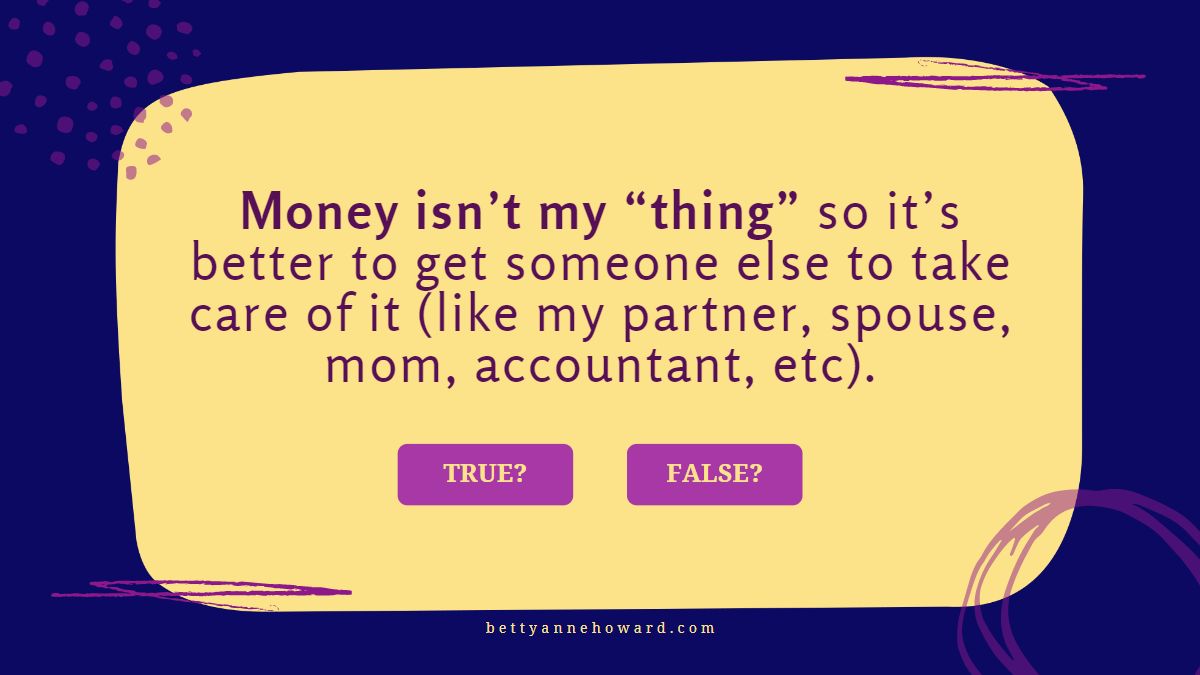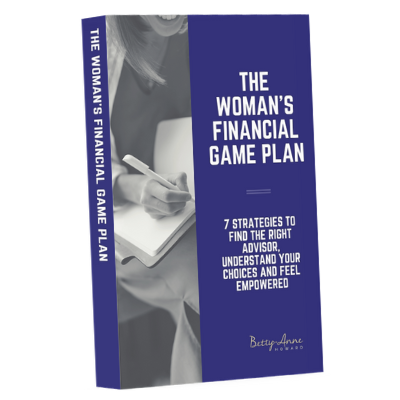
Financial planning and financial literacy as a whole can be confusing for many Canadians. Unfortunately, there is an abundance of myths and misconceptions that hold us back from engaging in a process that actually can be life-affirming, and freeing!
The financial planning industry as a whole can make things even more confusing – with the proliferation of confusing jargon, confusing products, and advisors who may seem to have hidden agendas. It can be hard to know who to trust.
But the reality is that financial planning is life planning – when you put together the pieces of the puzzle you can create a picture that makes sense and gives you clear, concise information for your future. Not only that, but it benefits yourself, your family, and even your community.
Let’s take a look at 5 common misconceptions about financial planning, and some strategies to increase your comfort level and knowledge!
Myth #1 – You don’t really need a cash buffer/emergency fund, your line of credit should be enough to cover you

Our Concern:
Life is unpredictable and at some point in all of our lives, we will experience a crisis or an unexpected expense will occur in our lives, that we hadn’t planned for. These crises range from needing emergency surgery for a pet, or an appliance breaking down all the way to being unable to return to your home due to a fire. One way to actually plan for the eventuality of this is to begin saving for a cash buffer/emergency fund.
The Big Mistake:
Thinking that your line of credit will suffice as your cash buffer emergency fund. No, no, no, no! Having a cash buffer is meant to provide you with some peace of mind in the midst of a crisis. Using your line of credit and adding to your debt burden will add to your anxiety and at the very least add additional unnecessary problems to deal with. You will have compound interest working against you if you continue to accrue debt as your emergency fund. If you have further emergencies then you may start dipping into your other investment accounts which further exacerbates the problem and jeopardizes your retirement, kid’s education, etc.
What To Do:
Set up a separate account that you earmark as your cash buffer/emergency fund so that you can allocate a certain amount each month into this fund. This would, ideally, be in a high-interest savings account and would also, ideally, be set up so that the money automatically goes from your chequing account to this savings account.
Your Goal:
Your goal for this account would be to have 3 to 6 times your monthly expenses saved up for emergencies. In other words if your monthly expenses are $5,000, 3X that amount would be $15,000. You’ll be surprised how quickly this account can start to build and therefore provide you with peace of mind that when some type of emergency comes up in your life, you have a buffer to take care of these additional expenses. The key is that when an emergency occurs, you aren’t tapping into your investments intended for your other goals like retirement, kids’ education and so on.
Gold Star:
You get a GOLD STAR if you’ve already started your cash buffer/emergency fund or allocated a certain amount of investment portfolio to this goal and this money is inside a guaranteed investment product and earmarked as such. Kudos to you!
Myth #2 – Financial planners just tell you how to spend your money (and I don’t want that!).

When I was 31, about ten years before I came into this business, this was my main concern about using a financial planner. I didn’t want anyone telling ME what to do with my money! My planner actually had to tell me to spend more money on myself which was a huge surprise and made me think differently about what kind of advice and support I could get from my planner.
Our Concern:
We know that Canadians who have a Financial Planner and Plan have higher net worth than those who don’t, remain invested when the markets do their inevitable swan dive downwards and therefore, ultimately are more likely to meet their goals. When things go wrong, the plan supports them, providing peace of mind given risk management has been and continues to be addressed as an essential component of financial planning. No one wants to be told what to do with their money, but that’s not the point of financial planning and financial planners.
The Big Mistake:
Just like me, if you are thinking and therefore avoiding working with a Financial Planner because you don’t want someone judging you or telling you how to spend or save your money, it’s important to recognize this mindset as a barrier. That barrier will stop you from seeking out guidance for your financial future. If you encounter someone in financial services who takes that approach, you don’t have to work with them. You can find someone else who can map out a plan with you, one that will inspire you to take whatever steps you need to in order to move forward in reaching your goals.
What to Do and Your Goal:
What’s most important is to start with having a clear understanding of where you want to go in your life, in 2, 3, 5, 10, or 20 years time. Quantify those goals, ie put a price tag on each of them, and, see where you are today financially. That includes your cash flow and how you’re going to get to where you want to go within those time frames. This may include having a more in-depth look at your cash flow to see where and how you can free up some money to put toward your goals. It’s your choice to make, no one is going to tell you or force you to do anything. Having a clear picture about how much you need to start saving and/or investing to meet your goals is very powerful. It’s the “why” behind understanding what is coming into your bank account each month and what is going out. You can call this budgeting, cash flow planning, or call it whatever you want – it’s your choice, it’s your money, and your goals to reach for and achieve.
Gold Star:
The GOLD STAR for this myth goes to my Financial Planner who by virtue of her engaging with me through the financial planning process, challenged all of my assumptions, so I am now living my dreams because she and I drew up a plan. She kept me focused on the road ahead and held my hand whenever I lost my way. She was also the one who encouraged me to come into this business – 24 years ago, and I am grateful that she did.
Myth #3 – Financial Planners are all about sales and hustle and aren’t concerned with my particular situation

Have you ever met with a sales person in financial services? It’s well known that the banks put their front-line staff under a lot of pressure to sell products because that’s how they make their money, often, there are quotas expected to be met by certain staff. It’s no wonder people assume and fear this is what’s going to happen to them when they meet with a Financial Planner. We’ve all heard horror stories about being sold an investment product with no due diligence around time frame, risk profile, ability to assume what amount of risk, understanding of risk, and capacity to assume certain levels of risk. Similarly, my younger brother tells the story of an insurance salesman trying to guilt trip him into buying insurance.
Our Concern:
We want to, first of all, acknowledge that there is a grain of truth in this concern about being sold something. In many cases that’s how the business of financial services works, there are products and services to be sold that generate revenue. However, many financial services practices like ours don’t work like that. Instead, we want to understand your needs, come up with a plan hand in hand with you that, when implemented, may or may not result in our getting paid. You will know as we are fully transparent about how we get paid, similar to many reputable and respectable financial service providers.
The Big Mistake:
Thinking all Financial Services people are alike and if you’ve had a “bad” experience, denying yourself the ability to move forward with someone else who is better suited to meet your needs.
What To Do:
Seek financial services from those who will walk you through your options for the services they provide and what you are seeking along with full transparency on how those services will be paid for. For example, some Financial Planners will charge you for a Financial Plan, make sure you see and review their Letter of Engagement outlining those services. Or Financial Planners can also be paid via your investments, a certain percentage of the fees for managing your money gets paid to the Advisor who puts those investments in place for you. Again, make sure you get the information in advance as to how the structure will work and what it will cost you for the services you receive.
Your Goal:
The bottom line, what’s most important is that you begin building a trusting relationship with a Financial Services Provider. Make sure they are aligned with your values and purpose. Also, be sure you ask questions about how the financial service provider will get paid and what you can expect from them, for the services rendered and get that in writing.
Gold Star:
You get our GOLD STAR if you have a trusting relationship with a Financial Planner whose values are aligned with yours, continues to be engaged in all aspects of your life stages, and has knowledge and expertise in areas such as Philanthropy and Estate Planning.
Myth #4 – Financial Planners will make me invest in companies I’m not comfortable with

Our Concern:
We are hearing this more and more, and we are aware that a lot of financial institutions are not having this conversation with clients. As with myth #3 above, it’s imperative that you are working with a financial professional who you feel comfortable with. This will enable you to ask questions and speak about your values, where you are and are not comfortable investing your money.
The Big Mistake:
Avoiding investing. Saving for your financial goals is much easier when you get your money working for you. A portion of your savings should be invested to ensure that your savings are growing enough to cover the increasing costs of living to support you in retirement. Don’t avoid investing because you’re worried about how your money will be supported. Work with your advisor to find a solution that works for you.
What to do:
There is now a WIDE variety of socially responsible and environmentally conscious investments out there, both exchange-traded funds and mutual funds have many ways to either “filter out” undesirable companies or even strictly focus on green initiatives. These investments have been around for many years, and new options are coming out all of the time. Don’t let the naysayers tell you there’s no “track record.” Look for a financial planner who specializes in this field. They are out there! We have been a member of the Responsible Investment Association for 23 years and are constantly upgrading our skills in this area. We know this is what our clients want, and we are happy to go the extra mile to ensure we are providing quality advice. In addition, responsible investing fits well with our concerns about the environment, social justice issues and our social purpose.
Your Goal:
Your goal should be to build your portfolio in a way that makes you feel good about investing and not like you’re contributing to problems the world is facing. We can do better, and where you invest your money can be a driving force for financial institutions to pay more attention to this type of investment.
Gold Star:
On this one, our GOLD STAR goes to all of the investors who have come before you who have demanded this type of investment. It is because of your values and your voices that the number and type of investments have grown as much as they have over the years.
Myth #5 – Money isn’t my “thing” so it’s better to get someone else to take care of it (like my partner, spouse, mom, accountant, etc).

Our Concern:
Sure, this might alleviate some conflict, and we understand that finances aren’t everyone’s forte. However, we have seen over and over again what happens when one spouse is left out of the financial planning or decisions whether it be by choice, convenience, or otherwise. As soon as the “money person” is no longer there, it’s incredibly overwhelming for the one who suddenly has to take things into their hands. It can also be shocking to that person when things don’t turn out to be what they thought they were.
The Big Mistake:
Hiding money / feelings / stories / fears from your partner. Being in a committed relationship means sharing everything (as agreed by both of you). We’re not saying you can’t have separate bank accounts or spending money. We are saying that you both need to be involved in financial planning. This includes sharing your feelings, fears, and past money stories with your partner. Both of you need to know what’s going on so that things will continue to go smoothly regardless of what the future brings.
What to do (if you’re the money person):
Chances are you’re the one reading this article. Great! Encourage your spouse to get involved. Start by sharing this article. Make sure they are also seeing your bank statements and investment statements and set time aside to talk money and planning. Encourage them also to attend financial planning meetings with your advisor.
What to do (if you’re not the money person):
If you’re reading this article without being asked, hurray! Perhaps you’re more of a money person than you thought. If you’ve been asked by someone else to read it, thank you for doing so. We hope this is the first step into the wonderful world of financial discovery! Start small, don’t try and learn everything all at once, but start with the items mentioned in the previous paragraph.
Your Goal:
To work as a team when it comes to finances. Making sure that you each fully disclose to the other where you’re saving, spending, investing and why. Make sure that you’re sharing with your partner WHY these things are important to you so that they can understand where you’re coming from.
Gold Star:
The GOLD STAR here goes to those of you who are NOT inclined to deal with the “money stuff” but are doing it anyway!! Good for you. There are many reasons why we shy away from money, and sometimes we have to get uncomfortable before we can get comfortable. If that’s you, congratulations, and we wish you every support in your continued journey.
Summing It Up

As you can see, there are many myths and misconceptions when it comes to Financial Planning. But many of these deserve debunking! It is truly worth your time, effort, and resources to engage in the Financial Planning process, no matter how much you might think it’s not for you.
Putting together the pieces of your financial puzzle can be easier with a guiding hand from a professional who not only understands financial planning but who also has a firm grasp of philanthrophic planning and insurance solutions.
If you are like so many people who are uncertain about where to go for these services we highly recommend finding a reputable Financial Planner who can engage with you in meaningful conversations about your desires, hopes, and dreams. A Financial Planner who can show you different strategies you can use to meet your goals in a way that is clear, concise, practical, and builds your confidence in making informed decisions about your own financial journey.
Here’s to YOU achieving your GOLD STAR! We’re confident that you can do it.
__________________
Enjoyed this article? You might also enjoy:
Will I Have Enough Money In My Retirement?
Women, Estate Planning, and Philanthropy: Hand In Hand or Hand In Heart?
Passing On The Family Cottage: The Top 5 Things To Help You Prepare






0 Comments